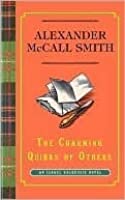I’ve been working my way through this series set in Edinburgh featuring Isabel Dalhousie. Well, work isn’t really correct since each story is delightful. As a moral philosopher, Isabel “considers” problems and mysteries that others request her help with. Once someone has asked for her help, she believes she is morally obligated to try.
In this, the seventh entry in the series, Isabel has been asked by the wife of a trustee to help an exclusive boy’s school in their search for a new headmaster. The shortlist contains only three names, but the trustee has received an anonymous letter saying that one of the three has a skeleton in his closet that would disqualify him. Isabel is asked to look into their backgrounds to determine which is the problematic candidate.
After agreeing, despite her fiancé Jamie’s usual objection to her investigations, Isabel is surprised to discover that her niece Cat’s new boyfriend is one of the three. Cat is rather intense, going through boyfriends like candy and frequently arguing with Isabel, yet the young woman runs her successful deli with a firm hand. Jamie was once one of those boyfriends, and his relationship with Isabel—they have a charming toddler and plan to marry imminently—is a constant, if minor, source of tension between Cat and Isabel. However, underneath it all, the two women are devoted to each other.
Isabel practices her philosophy not only as editor of the Review of Applied Ethics and the now-defunct Sunday Philosophy Club of the earlier books in the series, but in every aspect of her life. When one of her former colleagues-cum-enemies on the Review magisterially informs her that he is going to write a review of the new book from his partner in crime—the crime of trying to force Isabel off the magazine—Isabel debates the ramifications of each possible response. If she refuses, would that be seen as an act of vengeance? Should she be generous and forgive the two men for present and past indignities?
She also considers just how generous she ought to be when a tragic young cellist falls for Jamie. Jamie is a bassoonist and rather younger than Isabel which feeds her insecurity about their relationship.
It is this application of philosophy to the smallest details of life that I find intriguing in these books. Many people know the author from his No. 1 Ladies’ Detective Agency series. Like those books, the Dalhousie books belong to what Dave King calls the gentle genre: “straightforward tales of ordinary people in mostly every-day, low-key situations.” Authors like D.E. Stevenson, Miss Read, and James Herriot manage the difficult task of composing these stories that become comfort reads for many of us, without falling into “either banality or saccharine gooeyness.”
The solution Dave King identifies is the use of a small town with many characters interacting, noting that “Even Alexander McCall Smith’s Scotland Street books, technically set in Edinburgh, are limited to a neighborhood that acts in most ways like a small town.” “In fact,” he goes on, “most gentle novels draw their tension from this forced association. The connections with people who think very differently from yourself can help amplify the importance of small things.”
That’s certainly true here, with a variety of characters, some new and some familiar from earlier books. However, it’s the philosophy that elevates Isabel’s stories, not the labored dense prose that I struggled with in Philosophy 101, but a common-sense application of moral considerations to the minutiae of daily life.
Added to that are the descriptions of Edinburgh itself and the surrounding countryside. I recently visited that city for the first time, and I love the memories these books call up. The books aren’t perfect, of course. Jamie and Cat are rather two-dimensional, and Isabel herself doesn’t change much as the series progresses. Also, her rather privileged life may rub some readers the wrong way.
For me, they make a nice counter-balance to my other, more challenging reading. Like Alexander McCall Smith’s other books, these make for perfect bedtime reading, when you want to calm your mind and prepare to enter a world of good dreams.
Which Alexander McCall Smith series is your favorite?
